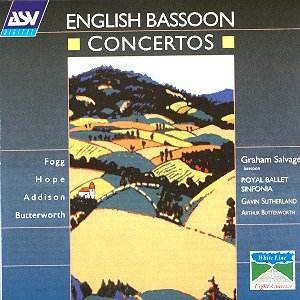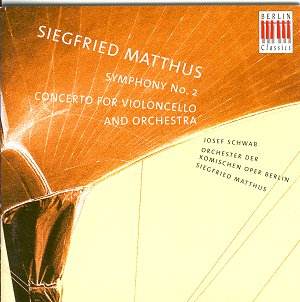 Composer: Eric Fogg, John Addison, Peter Hope, Arthur Butterworth
Composer: Eric Fogg, John Addison, Peter Hope, Arthur Butterworth
Works: Bassoon Concerto (1930), Bassoon Concertino (1998), Bassoon Concertino (2000), Summer Music (1985)
Performers: Graham Salvage (bassoon), Royal Ballet Sinfonia, Gavin Sutherland (conductor)
Recording: 26/27 Feb 2001, Whitfield Street Studios, London
Label: ASV CD WHL 2132
The bassoon, often relegated to the role of the comic relief within orchestral settings, deserves a more prominent place in the solo spotlight, a position that this collection of English concerted works seeks to champion. The four pieces featured here—spanning several decades and diverse styles—illuminate the instrument’s expressive potential, showcasing both its lyrical depth and rhythmic versatility. This compilation is a significant contribution to the largely underrepresented solo bassoon repertoire, particularly for works that are, for the most part, first recordings.
Graham Salvage, principal bassoonist of the Hallé Orchestra, emerges as a compelling advocate for these unjustly neglected compositions. His technical prowess shines through, especially in Eric Fogg’s Bassoon Concerto, a work that surprisingly has not been part of the regular concert repertoire since its premiere in 1930. The concerto’s lush slow movement, marked by its sweeping melodic lines, benefits from Salvage’s nuanced phrasing, allowing the lyrical quality of the bassoon to resonate with warmth and poignancy. The writing here is particularly commendable; the orchestration complements the bassoon’s timbre, creating a rich sonic tapestry that invites deeper listening.
In contrast, John Addison’s Bassoon Concertino is a delightful romp, infused with a sense of humor and buoyancy that reflects the composer’s characteristic style. Each of its four movements reveals a playful engagement with the instrument, where Salvage’s articulation and expressiveness come to the fore. The playful dialogue between the bassoon and orchestra in the lively outer movements juxtaposes nicely with the introspective second movement, allowing the listener to appreciate the instrument’s versatility.
Peter Hope’s Bassoon Concertino, on the other hand, showcases a more eclectic approach, incorporating jazz and blues elements that add a contemporary flair to the proceedings. The first movement’s juxtaposition of lyrical and rhythmic motifs is executed with precision, while the second movement’s jazz influences are seamlessly integrated, showcasing an innovative approach to the traditional concerto form. The finale, infused with Latin American rhythms, demonstrates Salvage’s agility and rhythmic clarity, making for an engaging and vibrant conclusion.
Arthur Butterworth’s Summer Music stands apart in its introspective quality, often evoking the melancholy beauty of the Yorkshire Dales. This piece, conducted by the composer himself, presents a reflective soundscape that resonates with the pastoral themes often associated with English music. The orchestration here is particularly effective, allowing the bassoon to interact delicately with the strings, creating an ethereal atmosphere that is both haunting and beautiful. Salvage’s interpretation captures the essence of the piece’s wistfulness, underlining the emotional depth that characterizes much of Butterworth’s output.
The recording quality is commendable, with a clear, focused sound that brings out the nuances of both the soloist and the orchestra. Every note is captured with clarity, allowing the distinctive timbre of the bassoon to shine without overshadowing the accompanying ensemble. The engineering does justice to the dynamic contrasts within each work, ensuring that the listener can fully appreciate the intricate interplay of voices.
This compilation not only serves as an excellent introduction to a repertoire often overlooked but also provides a vital service to the appreciation of the bassoon as a solo instrument. The performances by Salvage and the Royal Ballet Sinfonia under Gavin Sutherland’s baton are both polished and insightful, offering a fresh perspective on these works. The disc stands as a testament to the richness of the English bassoon repertoire, leaving the listener with a renewed appreciation for its lyrical and expressive capabilities.



